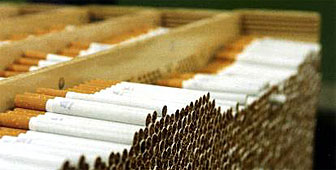Government goes on offensive against smoking

The government has launched a new campaign aimed at cutting smoking, which is kills an estimated 8,000 people each year in Switzerland. Proposed measures include a ban on cigarette sales to youngsters under 16, and a hike in prices.
Announcing the five-year prevention programme, the director of the Federal Health Office, Thomas Zeltner, said Switzerland had lagged behind its European neighbours in promoting anti-smoking policies.
Zeltner said Switzerland has the third highest number of smokers per capita in Europe after Hungary and Greece, with two million smokers in a population of less than eight million. He added that smoking related illnesses were a major burden on the economy, costing some SFr10 billion in 1995.
The new campaign, entitled “Smoking is harmful”, aims to heighten awareness among all sectors of society about the dangers of smoking.
Developed in conjunction with the Swiss Association for Smoking Prevention and the Swiss Cancer League, it includes a series of television advertisements and a web site, which offers tips and guidance on how to stop smoking.
The government expects to spend some SFr32 million on the campaign over five years. It intends to ban sales of cigarettes to those under 16, and wants tobacco firms to give more prominence to warnings on cigarette packets.
The government also wants to push through a hike in prices to bring the tax on tobacco in line with the European Union average of 56 per cent. That would increase the price of a packet of cigarettes to SFr5.20 from around SFr4.70 at present.
Zeltner cited a World Bank study, which showed that a 10 per cent hike in the price of cigarettes led to a four per cent drop in consumption.
In an interview with swissinfo ahead of the launch of the campaign, Zeltner said Switzerland needed a more detailed national policy on tobacco and smoking prevention. He pointed out that in the past such policies in Switzerland have been isolated and somewhat haphazard.
“We cannot really say we have had a lot of success,” said Zeltner. “It’s true we had a couple of good projects in the past, but they certainly did not reach the prevention goals we wanted.”
swissinfo with agencies

In compliance with the JTI standards
More: SWI swissinfo.ch certified by the Journalism Trust Initiative









You can find an overview of ongoing debates with our journalists here . Please join us!
If you want to start a conversation about a topic raised in this article or want to report factual errors, email us at english@swissinfo.ch.